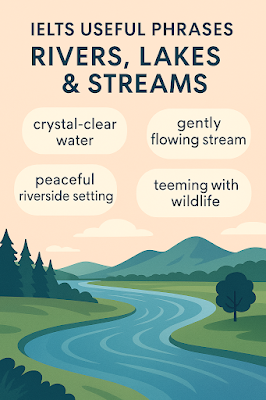✦ IELTS Speaking Practice Test – Rivers, Lakes & Streams
✦ 1. Crystal-clear water
Definition: Water that is very clean, transparent, and pure.
Sentence: The island was surrounded by crystal-clear water, perfect for snorkeling.
Sentence: The island was surrounded by crystal-clear water, perfect for snorkeling.
✦ 2. Gently flowing stream
Definition: A small river that moves slowly and smoothly.
Sentence: We sat by a gently flowing stream, listening to the calming sound of the water.
Sentence: We sat by a gently flowing stream, listening to the calming sound of the water.
✦ 3. Peaceful riverside setting
Definition: A quiet and relaxing area beside a river.
Sentence: The café had a peaceful riverside setting, ideal for reading and enjoying a cup of tea.
Sentence: The café had a peaceful riverside setting, ideal for reading and enjoying a cup of tea.
✦ 4. Glacial lake
Definition: A lake formed by melting glaciers, usually very clear and cold.
Sentence: The glacial lake reflected the snowy peaks like a mirror.
Sentence: The glacial lake reflected the snowy peaks like a mirror.
✦ 5. Waterfront area
Definition: A part of a town or city that is next to a body of water, often used for leisure.
Sentence: The waterfront area is full of restaurants, walking paths, and street performers.
Sentence: The waterfront area is full of restaurants, walking paths, and street performers.
✦ 6. Meandering river
Definition: A river that follows a winding or curved path.
Sentence: The meandering river added charm to the landscape as it twisted through the valley.
Sentence: The meandering river added charm to the landscape as it twisted through the valley.
✦ 7. Soothing sound of water
Definition: A calming or relaxing noise made by moving water.
Sentence: I fell asleep to the soothing sound of water from the nearby fountain.
Sentence: I fell asleep to the soothing sound of water from the nearby fountain.
✦ 8. Teeming with wildlife
Definition: Full of animals, especially in natural water areas.
Sentence: The marshland was teeming with wildlife, including ducks, frogs, and dragonflies.
Sentence: The marshland was teeming with wildlife, including ducks, frogs, and dragonflies.
✦ 9. Scenic views across the water
Definition: Beautiful or picturesque sights of a river, lake, or ocean.
Sentence: We chose a hotel with scenic views across the water and watched the sunset every evening.
Sentence: We chose a hotel with scenic views across the water and watched the sunset every evening.
✦ 10. Flood-prone area
Definition: A location that is likely to experience flooding, especially during heavy rain.
Sentence: They built higher foundations because the village is a flood-prone area.
Sentence: They built higher foundations because the village is a flood-prone area.
Part 1: Introduction & Interview
-
Do you like spending time near water?
-
Are there any rivers or lakes in your area?
-
What do people usually do near rivers or lakes in your country?
-
Would you prefer living near a river or in the mountains?
-
Do bodies of water attract many tourists where you live?
Part 2: Cue Card
Describe a river, lake, or stream you have visited.
You should say:
-
where it is
-
what it looks like
-
what people do there
and explain why you enjoyed being there.
✦ Sample Answers Using the Phrases
Part 1 Answers
1. Yes, I find water very calming—especially the soothing sound of a gently flowing stream.
2. There's a meandering river near my house where people like to walk their dogs.
3. People love fishing, picnicking, or just relaxing with scenic views across the water.
4. I'd prefer a peaceful riverside setting—water brings a sense of calm.
5. Definitely. Our city’s waterfront area is always filled with tourists, especially in summer.
Part 2 Sample Answer
One of the most beautiful places I’ve visited is Lake Tekapo in New Zealand. It’s a stunning glacial lake with crystal-clear water that reflects the mountains around it.
We stayed in a cabin that offered scenic views across the water, and at night, the sky was filled with stars. It felt so peaceful, with the soothing sound of water and barely any noise.
There were ducks and birds everywhere—the lake seemed teeming with wildlife. It’s the kind of place that makes you feel calm and in touch with nature.
I loved the peaceful riverside setting and would go back in a heartbeat.
✦ Comprehension Test: Rivers, Lakes & Streams
1. "The lake had crystal-clear water you could see right through."
Q: What does “crystal-clear” suggest about the water?
2. "We followed a gently flowing stream through the forest."
Q: How was the stream moving?
3. "The hotel was in a peaceful riverside setting—perfect for relaxing."
Q: What was special about the hotel’s location?
4. "The glacial lake was surrounded by snow-capped mountains."
Q: What kind of lake is being described?
5. "The city’s waterfront area is popular for walking and dining."
Q: What do people do in the waterfront area?
6. "The meandering river curved its way through the valley."
Q: How did the river move?
7. "I love the soothing sound of water from nearby streams."
Q: What feeling does the sound of water create?
8. "The wetlands were teeming with wildlife, especially birds and frogs."
Q: What kind of life is found in the wetlands?
9. "Our cottage had scenic views across the water at sunset."
Q: What made the cottage location special?
10. "That village is in a flood-prone area and often suffers during the rainy season."
Q: What problem does the village face?
✦ Answer Key
-
It’s extremely clean and clear.
-
Slowly and calmly.
-
It was quiet and close to a river.
-
A lake formed by glacial activity.
-
Walk and eat near the water.
-
It moved in curves or bends.
-
Calmness or relaxation.
-
Many animals and birds.
-
It overlooked beautiful water scenes.
-
It’s at risk of flooding







